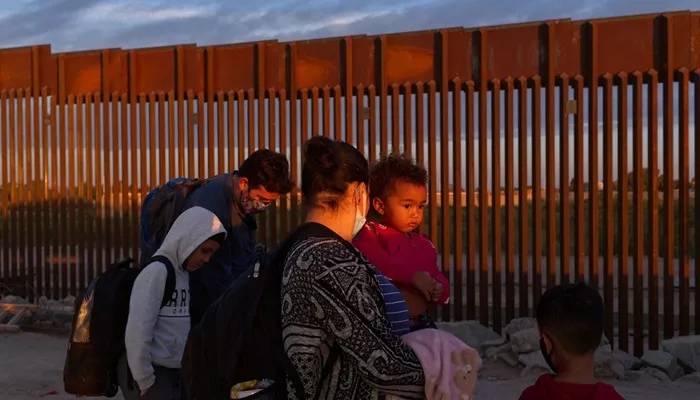Immigration Policy Debate Intensifies Ahead of U.S. Elections.
For nearly 250 years, immigration policy has been a contentious issue in the United States. With an increase in border crossings at the U.S.-Mexico border in recent years, immigration is a central topic in the upcoming elections and a significant concern for many voters in Virginia.
Diverging Views on Immigration Among Virginians
The views of Virginians are divided when it comes to the immigration policies of the presidential candidates. Republican nominee and former President Donald Trump has advocated for continuing the construction of a wall along the U.S.-Mexico border and increasing the deportation of individuals who have entered the country illegally. In contrast, Democratic nominee Vice President Kamala Harris supports enhancing pathways to citizenship and addressing the root causes of migration. Harris and her party have also attempted to collaborate with Republicans on increasing funding for border security, but these efforts have not succeeded.
At the state level, Virginia’s Republican Governor Glenn Youngkin and Attorney General Jason Miyares have criticized the Biden administration’s border policies. Both endorsed Trump in the primaries and joined him at a rally in Chesapeake over the summer.
Trump has a history of making unsubstantiated claims about immigrants, including allegations that other countries are releasing prisoners and those in mental institutions to enter the U.S. This rhetoric is seen by some, like Virginia Delegate Alfonso Lopez, a Democrat from Alexandria, as an attempt to appeal to white suburban voters through fear.
On the other hand, Jo-Ann Chase, a Loudoun County resident and long-time Republican activist, supports Trump’s hardline stance on immigration. Chase, who identifies as Latino, was proud to cast her vote for Trump at the Republican National Convention. As a lifelong Republican, she has worked extensively on outreach to Hispanic and Latino communities and served on Governor Youngkin’s Virginia Latino Advisory Board.
Chase stated that Trump’s controversial remarks about immigrants from Latin American countries never offended her. She interpreted his comments as a warning about certain individuals rather than a condemnation of all immigrants.
Born in Puerto Rico, Chase has always been an American citizen. She believes that the Biden-Harris administration’s border policy rewards those who break the law by entering the country illegally. As she canvassed for the GOP in recent months, she found that immigration policy and border security were top concerns among potential Republican voters in Virginia.
Former state delegate Elizabeth Guzman, originally from Peru, expressed her enthusiasm for voting for Harris at the Democratic National Convention. Guzman believes that Harris, as the daughter of immigrant parents, can inspire her daughters to believe they too can become presidents one day.
Guzman and Lopez have been frustrated by the Republican portrayal of Democrats as soft on border security, pointing out that Democrats have tried to work with Republicans to strengthen border measures. Lopez suggested that the GOP’s decision to back out of bipartisan efforts on border security allowed immigration to remain a key issue for Trump and other Republican candidates as the elections approach.
Michelle Mittlestadt, communications director for the Migration Policy Institute, said the GOP’s focus on immigration is expected given its significance to the party. She believes immigration will remain a critical issue regardless of who wins the presidency or which party controls Congress, but the specifics of the debate may change.
Ongoing Challenges in Immigration Policy
Seventy percent of new U.S. citizens last year lived in just 10 states, including Virginia, according to U.S. Citizenship and Immigration Services.
In Virginia, Democratic lawmakers have proposed several bills to support immigrant communities, such as allowing undocumented minors access to state-funded healthcare and permitting certain immigrants to pursue careers in law enforcement. While the healthcare bill failed in committee, the law enforcement bill passed with bipartisan support but was later vetoed by Governor Youngkin.
At the national level, U.S. immigration policy has remained largely unchanged for decades. To become a U.S. citizen, individuals typically need to meet specific criteria, including being a permanent resident for at least five years. This often involves holding a green card or a special visa.
Immigrants can apply for special visas through family sponsorship or marriage to a U.S. citizen, and some may qualify for refugee status. Others, like the thousands of migrant workers in Virginia, hold temporary work visas. Additionally, some immigrants seek employment-based green cards to live and work in the U.S. permanently, but there is a cap of 140,000 such visas per year, a number that has remained static for decades.
Mittlestadt noted that many people enter the U.S. illegally because legal avenues are limited. With an estimated 11 million undocumented immigrants in the U.S., she believes the current immigration system does not adequately address the needs of employers, families, and those seeking humanitarian protection.
Addressing the cap on employment-based green cards could be a starting point for reform, she suggested.
Guzman highlighted other potential areas for bipartisan agreement, such as creating pathways to citizenship for Temporary Protected Status (TPS) holders and DACA recipients. TPS is granted to individuals from countries experiencing severe crises, such as armed conflict or natural disasters, who may wish to stay in the U.S. permanently. DACA, or Deferred Action for Childhood Arrivals, allows some children of undocumented immigrants to remain in the U.S., though it does not provide a pathway to citizenship.
Lopez pointed out that the creation of DACA was the last significant bipartisan effort on immigration in Congress. Mittlestadt emphasized that addressing immigration issues requires a multifaceted approach, involving border enforcement, addressing root causes in Central America, and implementing comprehensive reforms.
Solving immigration challenges will require sustained collective action from local, state, and federal leaders, Mittlestadt said. Until that happens, one thing is clear: “The immigration system that we have today is not firing on all cylinders.”


